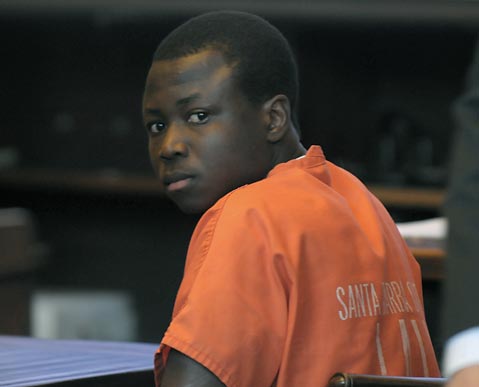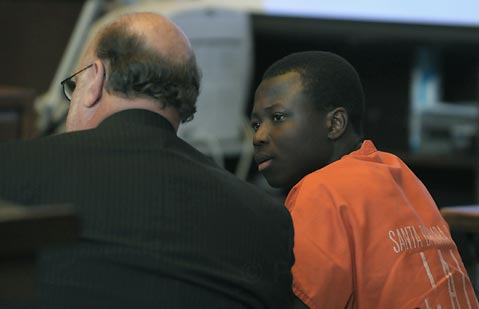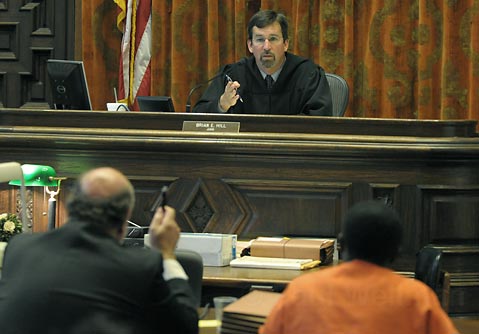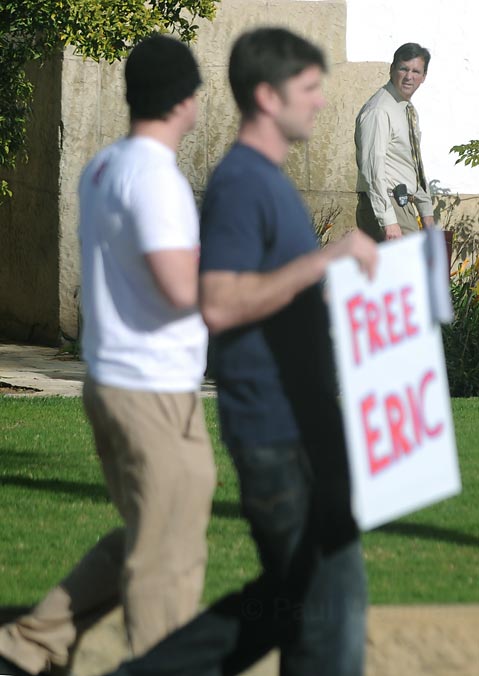Judge Denies Frimpong’s Habeas Corpus Petition
Former UCSB Soccer Star Convicted of Rape Claims Innocence

Judge Brian Hill issued an order on September 8 denying Eric Frimpong’s petition for a writ of habeas corpus, the latest roadblock for Frimpong and his supporters in their effort to prove his innocence and reverse his prison sentence.
Frimpong, a former soccer standout who helped lead UCSB to a national championship, was convicted of rape in December 2007 after a controversial three-week trial, and was sentenced to six years in state prison the following March. But his supporters have been ardently fighting on his behalf, armed with a firm belief in his innocence. They now plan to take the case back through the state appellate process, this time using the habeas corpus petition. A writ for habeas corpus is a legal action through which a person says he or she is being unjustly imprisoned. In California, the petitions are very rarely granted by trial courts.

In Frimpong’s case, he claims enough new evidence exists — combined with purported misconduct before and during his trial — that not only warrants a new trial but also actually shows he is not guilty. Frimpong filed a 670-page petition alleging, among other things, ineffective counsel by attorney Bob Sanger and prosecutorial and police misconduct. But Hill, in his 40-page order, said Frimpong did not meet “his heavy burden of stating a claim for actual innocence.”
The new evidence only raises the possibility of impeaching or contradicting other evidence presented at trial, Hill said. “It certainly does not point unerringly to his innocence,” he wrote. “At most, the evidence [Frimpong] offers in support of his innocence claim might raise a reasonable doubt as to his innocence. As stated above, that does not meet the standard for actual innocence.”
Joel Engel, a journalist and author who worked thousands of hours as a researcher and investigator both for the appeal and habeas corpus petition — he also wrote a nine-part series for The Independent in late 2009/early 2010, prior to the appellate court’s denial of Frimpong’s appeal — said the judge’s ruling was “thoroughly dishonest and disingenuous.”

Engel pointed to one part of Hill’s order in particular, where he wrote many people testified that both the victim and Frimpong were covered in sand. (The rape is alleged to have occurred on the beach). Engel said no witness ever testified that Frimpong was covered in sand, while a UCSB soils expert in Frimpong’s habeas corpus said the dirt on the victim was not sand and not from the beach. “[Hill] was not compelled by his conscience — legal, ethical, or otherwise,” Engel said.
Frimpong, in his writ, also claimed attorney Bob Sanger’s defense was ineffective. Frimpong argued Sanger didn’t call alibi witnesses, didn’t have bite-mark experts ready for trial, didn’t present an expert who could testify that the victim’s account of events was not reliable because of alcohol-induced blackouts (the victim likely had a 0.26-0.32 percent blood-alcohol level at the time of the attack), and didn’t adequately pursue evidence that the victim’s boyfriend was the one who assaulted her. Sanger only called one witness at trial, compared to 32 for the prosecution.
But Hill said there was no reasonable probability of a different result if the bite-mark expert had been presented, and that the victim’s testimony is not the sole evidence in the case. It is always easy to second guess a defense counsel’s performance after a guilty verdict, Hill said. “As noted throughout the opinion and the court of appeal’s decision filed on March 16, 2010, there was substantial evidence supporting the jury’s decision to convict petitioner,” he wrote.

Part of what made Frimpong’s case so intriguing was the fact that none of his DNA was found on the female, though her DNA was found on his penis and scrotum. Hill noted in underlined text that “it bears repeating that epithelial cells were found on [Frimpong’s] penis under circumstances where [Frimpong] denied any sexual activity with the victim.” Frimpong, who didn’t take the stand, said the victim had reached her hand into his pants.
But Mary Barron, the senior deputy district attorney who prosecuted Frimpong — who is now 25 years old and housed at a prison in La Palma, Arizona — said her office also feels Frimpong received a fair trial. “The Court of Appeal also concurred that the defendant received a fair trial,” she said. “After the Court of Appeal rendered its opinion, the California Supreme Court denied the defendant’s petition to grant further review of the matter. We further feel that the jury was in the best position to evaluate the evidence in this case, and in so doing, rendered a verdict that was just and correct.”
Frimpong, in the midst of a promising soccer career at the time of his arrest, has about 18 months left on his sentence. Once he is released, according to supporters, he will likely be deported back to his home country of Ghana.



